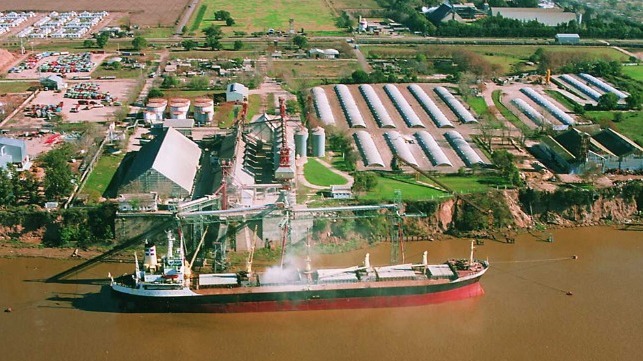Labor Action Impacts Argentina's Agricultural Ports and Exports

A long simmering dispute with the port workers developed into a job action that is impacting the operations of Argentina inland ports that are critical to the country’s agricultural exports. The unions representing dockworkers for products including grains, soybeans, and oilseed exports launched job actions at the ports while also calling on the Minister of Labor to intervene in the dispute.
Citing the failure in negations along with accusing the port employers of treating them with a lack of respect and delaying, the dockworkers are striking, refusing overtime, and slowing activities in a range of ports primarily located along the Parana River. The dispute centers around wages as well as health and safety working conditions. The union has called for a reduction in the total number of working hours.
“They gave long excuses, stretching the deadlines by months,” wrote the heads of the two unions in a letter to the Minister of Labor referring to the employers in the ports. They said that once they were finally able to get to the negotiating table, “their attitude was one of total intransigence, closing the door to any type of negotiation.”
The workers had also been promised bonus payments due to the pandemic, which remain in dispute with the government attempting to act as a mediator. The unions say that the private ports only offered to pay 50 percent of the bonuses to the workers who provided services and not to pay it to those who were licensed. They called this proposal “out of place and unacceptable.”
The work action, which is dragging on for more than a week, is impacting the country’s agricultural exports. Reuters is reporting that at least five ships are currently being delayed at the ports impacting major companies including US grains company Archer Daniels Midland and others.
Argentina is one of the world’s largest suppliers of soybeans and soybean products as well as seed oils. By some estimates the products account for 40 percent of the country’s total exports.
In September, the unions staged a one-day nation-wide strike seeking to call attention to their issues and the failure to reach a collective bargaining agreement with the representatives of the private port owners.
“This fight that we are taking up today is not against the government, it is against the business sector that refuses to provide a living wage,” the union said, citing the efforts of its members who did not stop work during the pandemic, risking their lives and that of their families.
The port representatives have told the local media that the strike is illegal. They are citing a law in Argentina that requires a mandatory cooling off period.
The two sides appear to be far apart in their positions with little signs of compromise at this time.
